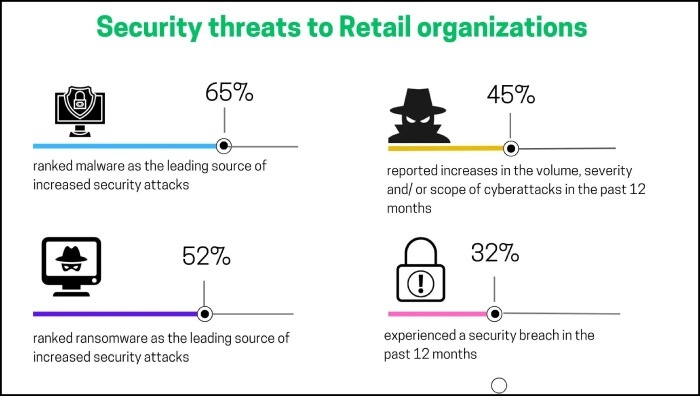Safeguarding Retailers Against Cyber Threats
Amidst the widespread digital transformation, the retail industry stands at the crossroads of innovation and vulnerability. Therefore, retailers need to draw their line of defense with a comprehensive approach to cybersecurity, including robust email security safeguards.
Retail stores, supermarkets, and mall outlets are among the most convenient options for ordinary individuals to avail of goods and services. However, the retail sector is one of the hardest-hit verticals in terms of cyberattacks.
The fact that retail enterprises store vast quantities of consumers’ confidential data and payment details makes them a prime target for malicious actors. Consequently, retail business attacks keep mounting, with an increase of 117% in 2021. Besides email scams, retail stores and establishments remain vulnerable to phishing and ransomware threats.
Key Statistics on Retail Business Attacks
The figures below explain the urgent need for retailers to invest in email protection and strengthen their defense mechanisms against all types of cyberattacks.
- Among all cyberattacks, 24% of threats target the retail industry.
- Cybersecurity concerns proved to be the key hurdle for 34% of retailers to venture into e-commerce.
- As much as 99% of cyberattacks on the retail industry are financially motivated.
- 42% of the data compromised in a cyberattack is related to payment, while 41% comprises personally identifiable information (PII).
- Privacy breaches and cyberattacks are the most severe digital threats, according to 34% of retailers.
What Makes Retailers a Soft Target for Malicious Actors?
Retailers are a soft target for malicious players as they store large volumes of customer data, which includes their credit card numbers and PII. Thus, they are a goldmine for threat actors who steal these details. While some sell these details on the dark web, others try to leverage the data directly for financial gains.
Today, a significant share of retail businesses operate in a hybrid environment. While they use PoS in brick-and-mortar settings, e-commerce retailers largely depend on cloud-based systems. Common cybersecurity issues surrounding this hybrid environment include:
- Software vulnerabilities
- Usage of insecure third-party plugins
- Cloud-based botnets
- Near Field Communications (NFC)
- PoS systems lacking P2PE (Point to Point Encryption)
Fortifying Retail Organizations Against Cyber Threats
Cybersecurity experts recommend the following countermeasures to prevent retail business attacks.
1. Implementing Multi-Layered Security
A multi-layered defense system defines the core of cybersecurity in the retail sector. Retailers need to incorporate a coordinated defense mechanism.
A combination of firewalls, encryption protocols, intrusion detection systems, and endpoint security can ward off various attack vectors. This multi-layered approach ensures that others limit the damage even if one security layer is compromised.
2. Conducting Regular Security Audits
With cyber threats continually evolving, retail businesses need to equip themselves to protect against sophisticated attack mechanisms. The situation calls for regular security audits to evaluate the integrity of your infrastructure.
These audits can help identify vulnerabilities and evaluate the effectiveness of existing security systems. Accordingly, retailers need to tweak their existing systems to strengthen their defense mechanisms.
3. Secure Payment Processing
Securing payment processing systems is of paramount importance for retail businesses. POS (Point-of-sale) breaches can lead to significant financial losses, eroding customer trust.
Implementing end-to-end encryption for payment data is crucial to prevent retail business attacks. Besides, retail businesses should adopt tokenization techniques and comply with Payment Card Industry Data Security Standard (PCI DSS) regulations.
4. Employee Training and Awareness
No cybersecurity system is foolproof if employees aren’t well-versed in best practices. Providing your employees with comprehensive phishing awareness training empowers them as the first line of defense against social engineering attacks, phishing attacks, and email scams. This type of training equips them with the knowledge and skills needed to recognize and thwart these threats effectively.
Trained employees are better poised to identify potential threats and respond to them promptly. They can help enhance the overall security posture of retail businesses.
5. Data Encryption and Secure Transmission
Since retail organizations handle vast consumer data, encrypting the information is imperative. Implementing secure protocols like HTTPS for online transactions and employing robust encryption algorithms can secure sensitive data from being intercepted by malicious players.
Final Words
The mission to thwart retail business attacks is an ever-evolving process. With attack mechanisms growing more sophisticated with the evolution of technology, preventing retail business attacks requires a more vigilant stance.
You are better poised to combat threats and preserve customer trust when equipped with the recommended strategies. Therefore, a robust and comprehensive cybersecurity approach is vital for maintaining an effective and efficient line of defense against malicious actors who have an eye on the retail industry.


